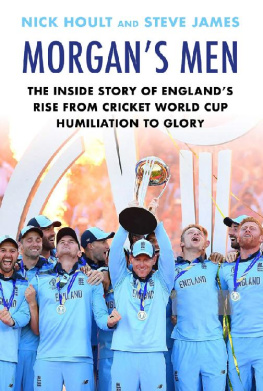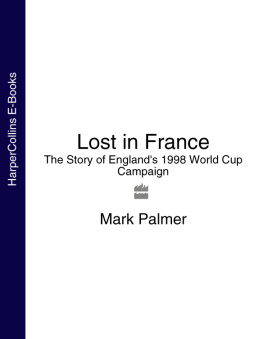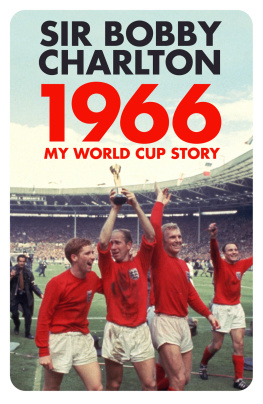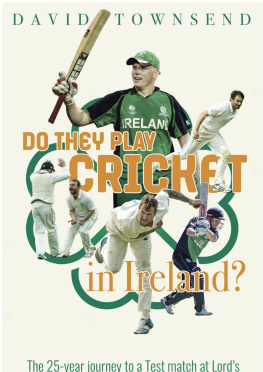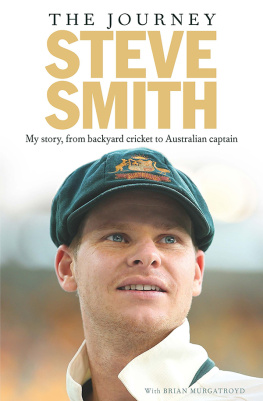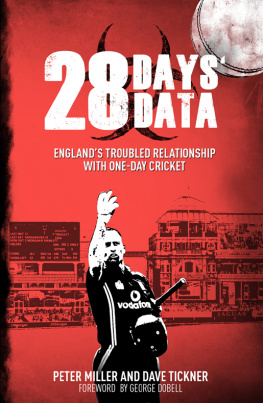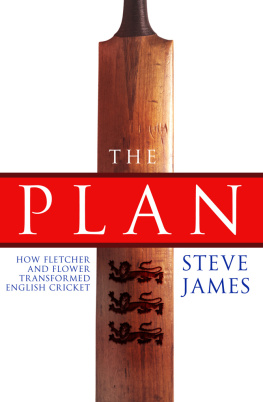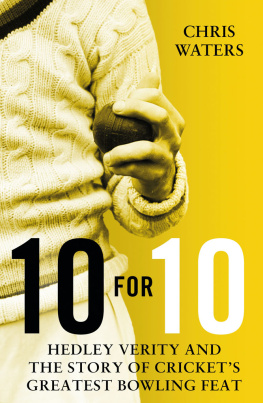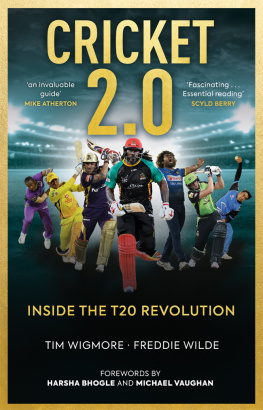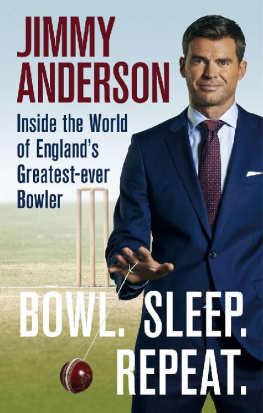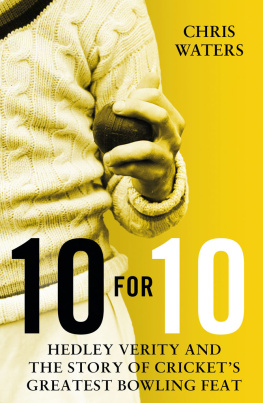MORGANS MEN
NICK HOULT AND STEVE JAMES
MORGANS MEN
THE INSIDE STORY OF ENGLANDS RISE FROM CRICKET WORLD CUP HUMILIATION TO GLORY
First published in Great Britain in 2020 by Allen & Unwin
Copyright Nick Hoult and Steve James, 2020
The moral right of Nick Hoult and Steve James to be identified as the authors of this work has been asserted by them in accordance with the Copyright, Designs and Patents Act of 1988.
All photographs courtesy of Getty Images
All rights reserved. No part of this book may be reproduced or transmitted in any form or by any means, electronic or mechanical, including photocopying, recording or by any information storage and retrieval system, without prior permission in writing from the publisher.
Allen & Unwin
c/o Atlantic Books
Ormond House
2627 Boswell Street
London WC1N 3JZ
Phone: 020 7269 1610
Fax: 020 7430 0916
Email:
Web: www.allenandunwin.com/uk
A CIP catalogue record for this book is available from the British Library.
Hardback ISBN 978 1 91163 093 7
E-Book ISBN 978 1 76087 483 4
Printed in
10 9 8 7 6 5 4 3 2 1
CONTENTS
To Bethan Amy James, daughter of Steve and Jane and sister of Rhys, who died aged just 21 in February 2020. Such a beautiful, kind and caring girl taken so early. She wanted to be a journalist like her dad .
ONE
FINE MARGINS
THE WORLD CUP FINAL ENGLAND V. NEW ZEALAND
LORDS, LONDON
14 July 2019
S unday, 14 July 2019 dawned grey and overcast in north-west London. Umbrellas were required for those arriving early at Lords for this the 12th Cricket World Cup final, the fifth at the grand old ground and the first there since 1999. But the forecast promised ever better weather throughout the day, and there was going to be a new name on the trophy by its end, with England in their fourth final and their first since 1992. New Zealand were beaten by Australia in their one final appearance in the previous tournament in 2015.
So, the frisson was understandable, but nobody could ever have envisaged what levels of excitement would be seen before that trophy finally was presented just after 8pm.
Because of the dampness, with the rain having only just stopped, the start was delayed by 15 minutes from its scheduled 10.30am slot. Once the covers had been removed, a green-looking pitch was revealed, although England captain Eoin Morgan, a Lords veteran, having only played his county cricket for Middlesex, had said the day before that its looks could be deceiving. From afar, it looks greener than it is, he said. There isnt a lot of grass on it. He knew that would be bad news for his big hitters and good for New Zealand. It levelled the playing field between the two sides. Home advantage was significantly reduced now.
Speaking on the popular BBC Tailenders podcast, broadcast live from the ground that morning, England Test bowler James Anderson was adamant that it was a morning on which to bowl first.
The old adage at Lords when assessing what to do at the toss has always been to look up rather than down in other words, take more notice of the skies above (it was still cloudy when Sky Sports Nasser Hussain gathered Morgan and Kane Williamson, the New Zealand captain, together with Sri Lankan match referee Ranjan Madugalle for the toss) than the pitch down below.
The further complication was that England had built a reputation in the previous four years for being supreme chasers. But this tournament had challenged that thinking considerably. A combination of the slow pitches and the pressures of the tournament meant that batting first had become ever more fashionable.
What to do? There was much to consider. The decision at the toss here at Lords was always going to be tricky.
Morgan tossed the coin, and Williamson called tails. It fell as tails. Williamson elected to bat, but he admitted some confusion.
It was a tough decision, he said. If you look at the surface, I think it is a bat-first surface, but then you look up above and that brings in a bit of confusion.
England were going to bowl. Just. Asked if he was disappointed to lose the toss, Morgan said: No, not at all. It was a bit of a 5050 call. It is always difficult here at Lords with the overheads.
In the England dressing room, team performance analyst Nathan Leamon was happy. Oh, thank God, he said. England had got what they wanted without the pressures of inserting the opposition.
We thought the wicket would get stodgier as the game went on, and we also knew that the first ten overs were going to be very difficult, so we were trying to make a decision that took New Zealands easiest routes to victory off the table, said Leamon to The Times after the final. But we were on a knife edge. If the sun was shining, we were going to bat, and if it was cloudy, we were going to bowl. So, it was almost the perfect outcome. We didnt have to decide, and we got to do what we wanted to do anyway. The idea of having got the decision wrong in a World Cup final and that affecting how the game went was not something I wanted to have to go through.
And Morgan admitted afterwards to Sky Sports that it was a decision that took up too much of his time on that morning. It took up so much of my head space, he said. And it normally doesnt.
The first ten overs were going to be crucial. New Zealands openers had had a poor tournament up until that point. Martin Guptill was the leading run scorer at the 2015 tournament but was having a shocker here, while the left-handed Henry Nicholls had only been brought into the side after Colin Munro had failed to deliver and was dropped.
When in the third over Nicholls was adjudged lbw to Chris Woakes without scoring, it could have been a rather predictable tale. But Nicholls reviewed the decision by the Sri Lankan Kumar Dharmasena, who was not exactly the most reliable of the umpires in the tournament, and the ball was shown to be going over the top of the stumps.
Guptill, having survived a vociferous caught behind appeal off Jofra Archer in the second over a brilliant piece of umpiring from South African Marais Erasmus, who saw that the ball had brushed the batsmans back trouser pocket rather than bat began to show signs of his aggressive best with an uppercut six over third man off Archer and then a drive down the ground for four in the fourth over after advancing down the pitch to the same bowler. It felt as though the first wheel was coming off.
At this moment Andrew Strauss, the director of England cricket at the start of this England teams four-year plan in 2015 but now at the game working for Sky Sports, arrived in the writers section of the Lords press box. Just hope that this is not the day Guptill comes off, remarked a member of the media to him in a moment when making conversation prompted a departure from impartiality to patriotism.
Calm as anything Strauss replied: Just relax, there is nothing we can do about it up here. It was a fair point. It was also why he was such a fine captain of England, although even the excitement must have got to him by the days end.
Guptill soon went for 19, leg-before to Woakes, who bowled yet another probing opening spell, in a tournament full of them from him, of seven overs for just 19 runs. Guptill then wasted his sides only review by referring his decision upstairs. It was plumb.

